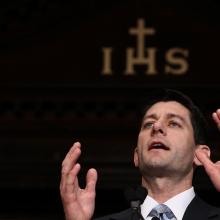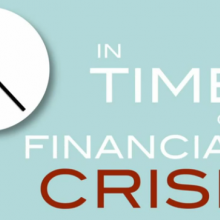Ryan budget
A group of Catholic Sisters set off for the Nuns on the Bus tour, speaking out against the House Republican budget that cuts funding for safety net programs and hurts those already in poverty.
NETWORK, a Catholic social justice group, is sponsoring the road trip, which departed from Ames, Iowa today.
Give Congressman Paul Ryan credit for persistence.
The Wisconsin Republican and architect of the GOP’s budget plan has spent a month arguing that his party’s proposals to cut programs for the needy while sparing the Defense Department and not raising taxes on the wealthy are in line with the social justice teaching of his own Catholic Church.
And for just as long, Catholic groups and theologians -- and even the Catholic bishops -- have been saying that in fact the GOP plan fails to meet the basic “moral criteria” of Catholic teaching.
Speaking at Georgetown University, Rep. Paul Ryan—the chairman of the House Budget Committee and a possible vice-presidential candidate— seemed to seek to quell the debate. He called his budget a roadmap to avoid a debt crisis that will hurt the poor hardest of all.
And he seemed to soft peddle his defense of the document as consistent with Catholic teaching.
“The work I do as a Catholic holding office conforms to the social doctrine as best I can make of it. What I have to say about the social doctrine of the Church is from the viewpoint of a Catholic in politics applying my understanding to the problems of the day,” he told an audience composed mostly of students, faculty and staff.
Rep. Paul Ryan is slated to speak at Georgetown University on Thursday morning. In the lead up, a group of professors and administrators is joining the chorus taking Ryan to task for claiming his budget proposal falls in line with Catholic teaching.
“Our problem with Representative Ryan is that he claims his budget is based on Catholic social teaching,” said Jesuit Father Thomas J. Reese, one of the organizers of the letter. “This is nonsense. As scholars, we want to join the Catholic bishops in pointing out that his budget has a devastating impact on programs for the poor.”
A week after House Budget Committee Chairman Paul Ryan claimed his Catholic faith inspired the Republicans' cost-cutting budget plan, the nation’s Catholic bishops reiterated their demand that the federal budget protect the poor, and said the GOP measure “fails to meet these moral criteria.”
That and other strongly-worded judgments on the GOP budget proposal flew in a flurry of letters from leading bishops to the chairmen of key congressional committee.
The letters to Capitol Hill were highlighted in a Tuesday (April 17) statement from the U.S. Conference of Catholic Bishops that came after Ryan, a Wisconsin Republican and rising conservative hero, told an interviewer last week (April 10) that his fiscal views were informed by Catholic social teaching.
Christianity Today’s film This is Our City is provocative because of its gritty, grounded honesty. This is not a film about political pundits who banter back and forth exchanging policy talking points. No. This short film reveals the lives and thinking of two very ordinary people, their deep faith in Jesus, and how that faith is leading them to engage two of the most consequential grassroots movements of our time. These two movements share one beautiful thing in common; they are groundswells of ordinary citizens reengaging their democratic civic duty—to let their messages by heard and considered in the public square.
D.C. Innes rightly points out in his reflections that the film’s title, “Liberty or Justice for All,” and its structure seem to pit the virtues of liberty and justice against one another. Within the first minute of this nearly seven-minute film, liberty is clearly the motivation for Emmett Bailey’s Virginia Tea Party involvement, while the motivation for Pam Hogeweide’s Occupy Portland involvement is clearly “justice.” And both subjects say their involvement is an outworking of their faith.
Rep. Paul Ryan’s (Chairman of House Budget Committee) FY2012 plan, A Roadmap for America’s Future, garnered princely praise in early April 2011, but it was quickly trailed by intense scrutiny when Ryan’s botched math and skewed priorities became apparent upon his budget’s review. Hailed as visionary and courageous upon submission, Ryan’s budget plan ultimately revealed his ideologically entrenched disregard for the poor.
A few weeks ago President Barack Obama announced his FY2013 Budget. Within a few weeks, Ryan will submit his FY2013 budget plan for review. Dr. Ronald J. Sider’s new book, Fixing the Moral Deficit (February 2012), comes just in time!
Sider has offered practical, balanced, and highly informed guidance for Christian engagement in the public sphere since publication of his first and seminal book, Rich Christians in an Age of Hunger (1977). Sider draws from his Just Generosity: A New Vision for Overcoming Poverty in America (Sider, 1999) to lay the philosophical foundation for this latest analysis in Fixing the Moral Deficit.
Sider starts with a simple premise: We have a deficit crisis. We also have a poverty crisis. Together these crises are producing a moral crisis in America.






